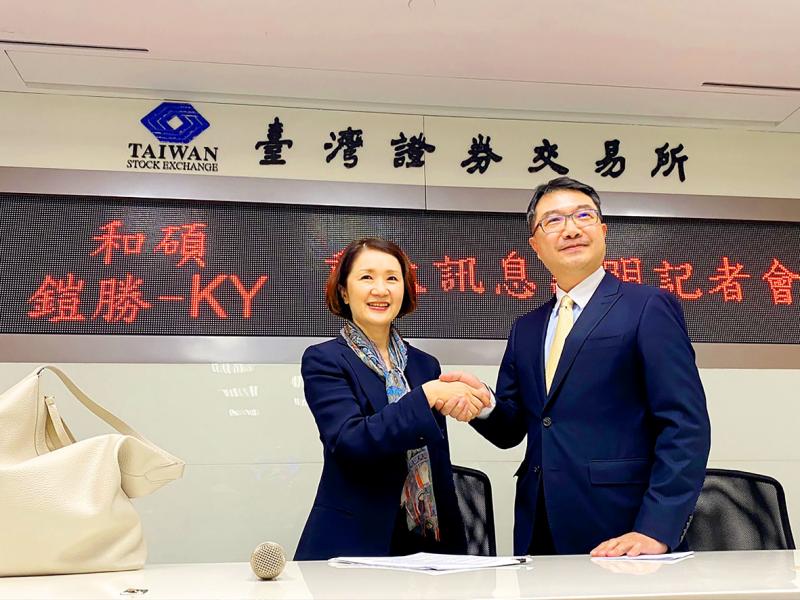Pegatron Corp (和碩), an Apple Inc assembly partner, yesterday said that it would fully absorb metal casing subsidiary Casetek Holdings Ltd (鎧勝) in a NT$14.5 billion (US$490.93 million) deal to improve the companies’ competitiveness in the phone assembly supply chain.
When Pegatron and Casetek suspended trading earlier in the day, speculation swirled that a possible purchase by China’s Luxshare Precision Industry Co (立訊精密) might be in the cards, but the announcement of the merger dispelled any conjecture.
The board of directories of each company agreed that Pegasus Ace Limited, a wholly owned subsidiary of Pegatron, would purchase Casetek in a reverse triangular merger, Pegatron chief financial officer Louise Wu (吳薌薌) told reporters, adding that after Pegasus Ace acquired Casetek, it would be dissolved and Casetek would become a 100 percent subsidiary of Pegatron.

Photo: CNA
“As mid-range brands are increasingly pressured to cost down, we need to be more flexible when it comes to meeting customer needs,” Wu said. “Consolidating Pegatron with Casetek means that we can share staff, resources and business freely, without being bound by our responsibilities to two sets of stockholders.”
Casetek is to be delisted from the local stock market upon completion of the deal. The date for the consolidation is set to be Feb. 26 next year.
The merger with Pegatron would better enable it to coordinate with Casetek, which would help both companies be more competitive, Wu said.
According to a joint statement, Pegatron is to buy Casetek common stock at a price of NT$87.5 per share, implying a 21.4 percent premium over Casetek’s average share price over the past 10 trading days.

To many, Tatu City on the outskirts of Nairobi looks like a success. The first city entirely built by a private company to be operational in east Africa, with about 25,000 people living and working there, it accounts for about two-thirds of all foreign investment in Kenya. Its low-tax status has attracted more than 100 businesses including Heineken, coffee brand Dormans, and the biggest call-center and cold-chain transport firms in the region. However, to some local politicians, Tatu City has looked more like a target for extortion. A parade of governors have demanded land worth millions of dollars in exchange

An Indonesian animated movie is smashing regional box office records and could be set for wider success as it prepares to open beyond the Southeast Asian archipelago’s silver screens. Jumbo — a film based on the adventures of main character, Don, a large orphaned Indonesian boy facing bullying at school — last month became the highest-grossing Southeast Asian animated film, raking in more than US$8 million. Released at the end of March to coincide with the Eid holidays after the Islamic fasting month of Ramadan, the movie has hit 8 million ticket sales, the third-highest in Indonesian cinema history, Film

Taiwan Semiconductor Manufacturing Co’s (TSMC, 台積電) revenue jumped 48 percent last month, underscoring how electronics firms scrambled to acquire essential components before global tariffs took effect. The main chipmaker for Apple Inc and Nvidia Corp reported monthly sales of NT$349.6 billion (US$11.6 billion). That compares with the average analysts’ estimate for a 38 percent rise in second-quarter revenue. US President Donald Trump’s trade war is prompting economists to retool GDP forecasts worldwide, casting doubt over the outlook for everything from iPhone demand to computing and datacenter construction. However, TSMC — a barometer for global tech spending given its central role in the

Alchip Technologies Ltd (世芯), an application-specific integrated circuit (ASIC) designer specializing in server chips, expects revenue to decline this year due to sagging demand for 5-nanometer artificial intelligence (AI) chips from a North America-based major customer, a company executive said yesterday. That would be the first contraction in revenue for Alchip as it has been enjoying strong revenue growth over the past few years, benefiting from cloud-service providers’ moves to reduce dependence on Nvidia Corp’s expensive AI chips by building their own AI accelerator by outsourcing chip design. The 5-nanometer chip was supposed to be a new growth engine as the lifecycle